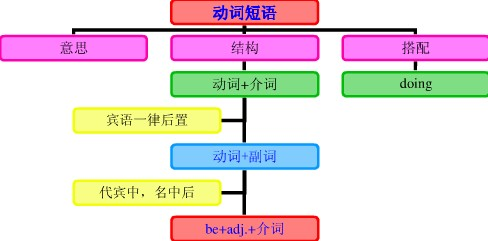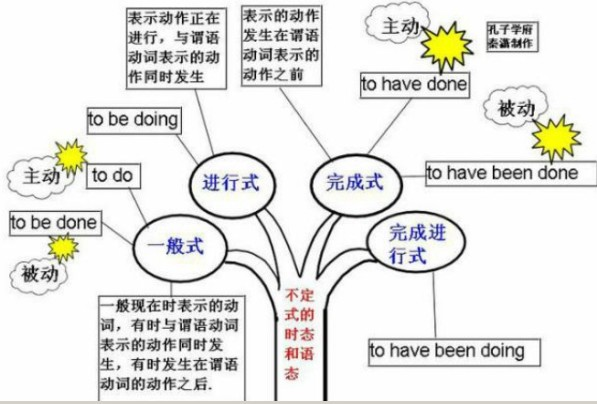本试题 “The accident is reported ________ the workers' misusing the facilities.[ ]A. to have been resulted inB. to result fromC. having resulted inD. to ha...” 主要考查您对动词短语
不定式的完成式
等考点的理解。关于这些考点您可以点击下面的选项卡查看详细档案。
- 动词短语
- 不定式的完成式
动词短语的概念:
动词常和某些其他词类用在一起,构成固定词组,形成所谓短语动词(phrasalverb)。和动词一样,短语动词也可分为及物和不及物两种。短语动词可以作为一个整体看待,同一般动词一样使用。
动词短语的搭配类型:
1)动词+介词:这类短语动词用作及物动词,后面须跟宾语。
如:The small boy insisted on going with his parents. 那男孩坚持要跟父母一起去。
Do you often listen to broadcasts in English? 你常听英语广播吗?
Look at the children. Aren't they lovely? 看着这些孩子们。他们多么可爱呀!
We stand for self-reliance. 我们是主张自力更生的。
这一类的短语动词还有很多,如depend on(upon)(依靠),wait on(服侍),look for(寻找),deal with(对待),look after(照料),wait for(等待)等。
2)动词+副词:
这类短语动词有的用作及物动词,有的用作不及物动词。
如:I always get up as soon as the bell rings. 我总是一打铃就起床。(不及物)
Look out, there's a car coming! 当心,来汽车了!(不及物)
Have you handed in your exercises already? 你已经交练习了吗?(及物)
Please don't forget to put on your coat, it's cold outside. 请不要忘记穿外衣,外面很冷。(及物)
这一类的短语动词还有很多,及物如put out(扑灭),eat up(吃光),put down(放下);不及物如set off(出发),come up(走近),go on(继续)。
注:"动词+副词"这类短语动词和上面第一类"动词+介词"的不同之处在于:"动词+介词"用作及物动词,后面须跟宾语。"动词+副词"则有的及物,有的不及物;用作及物动词而宾语为人称代词或自身代词时,副词往往放在宾语之后。
如:Please wake me up at five tomorrow. 请在明天早上五点唤醒我。
If you have done your exercises, please hand them in. 如果你们练习做完了请交来。
She doesn't normally behave like that, she's putting it on. 她通常并不如此表现,她是装出来的。
注:这类短语动词有不少可兼作及物和不及物动词用。
如:He took off his hat when he entered the office. 他进办公室后脱下帽子。(及物)
The plane took off at seven sharp. 飞机在七点整起飞。(不及物)
Charlie rang up Neil to ask about the time of the meeting. 查理打电话给尼尔问开会的时间。(及物)
If you can't come, please ring up and let us know. 你如来不了,请来电话告诉我们一声。(不及物)
3)动词+副词+介词:
"动词+副词"之后有的可以再加一个介词,形成另一种短语动词。这类短语动词用作及物动词。
如:Do not give up hope. We must go on with the experiment 不要失望。我们必须继续试验。(go on with继续)
He came up to me. 他走到我跟前。(come up to走近)
这类短语动词还有:look down upon(看不起),do away with(去掉),put up with(忍受)等。
4)动词+名词+介词:
这类短语动词也是及物的。
如:He shook hands with all the guests at the banquet. 他在宴会上和宾客一一握手。
Young pioneers often come to the Children's Palace to take part in after school activities.少先队员经常到少年宫来参加课外活动。
Pay attention to the temperature of the stored rice. 注意仓库里的稻谷的温度。
Her job is taking care of the babies. 她的工作是照顾婴儿。
这一类短语动词还有:put an end to(结束),take notice of(注意),catch hold of(抓住),lose sight of(看不见),make use of(利用)等。
动词短语知识体系:

不定式的完成式概念:
不定式的完成式主要表示已经完成的动作—既可能是表示先于谓语动作已经完成,也可能是先于某个特定时间已经完成。
如:I am sorry to have kept you waiting. (=I am sorry that I have kept you waiting) 对不起,让你久等了。
不定式的完成式(to have+过去分词)的用法:
1、表示在主句谓语的动作之前发生的事情:
如:I'm glad to have met your parents here. 我很高兴在这儿见到了你父母(已见过)
I'm sorry to have kept him waiting for me so long. 我很抱歉让他等了我这样久。(已经等过了)
2、动词不定式的完成式和下列动词的过去时连用,表示过去没有实现的事情:plan, hope, expect, be, intend, mean,w ish,等。注意一定是它们的过去时。另外还有should/wouldlike/love。这个结构表示“本打算/想/计划…”的意思。
例如:The game were to have taken place in Room. 比赛原计划在罗马举行。
He planned to have gone abroad last week.=He planned to go abroad but he didn't. 他原计划上周出国的。
I'd like to have been offered the job and(to have been)given the opportunity to prove myself. 我真想(当时)把这个工作给了我,给我个机会让我证明我自己。
同样的意思也可用上述动词的过去完成时加动词不定式的一般式来表达。
例如:I had hoped to visit the great pyramid.
=I hoped to have visited the great pyramid.
=I hoped to visitit, but I didn't. 我本希望参观大金字塔的。
They would have liked to have your help.
=They would like to have had your help.
=They wanted to have your help but they didn't have it. 他们本想得到你帮助的。
动词不定式时态知识体系:

不定式完成式的三点用法说明:
(1)表示发生在谓语动作之前的动作。
如:He seems to have caught a cold. 他似乎感冒了。
I hate to have quarreled with her. 我后悔和她吵架了。
I'm sorry to have given you so much trouble. 对不起给了你这么多麻烦。
(2)表示在某个给定的时间之前已完成的动作。
如:I hope to have finished the work by now. 我希望现在以前已完成这项工作。
(3)表示过去未曾实现的想法和愿望。
如:I should like to have come earlier. 我本想早点来的。
We were to have been married last year. 我们本来打算去年结婚的。
与“The accident is reported ________ the workers' misusing t...”考查相似的试题有:
- The hunter______ down and______ to the farmer that he had______ his gun against the tree.A.lay, lied, laidB.lay, la...
- It’s disappointing that no one could _________ a good idea to help us out of trouble.A.come off itB.come upC.come...
- It ___ to me that she didn’t know I had moved into the new house.A.appearedB.occurredC.happenedD.broke
- To get to the top of the mountain, we had to _______.A.go some walking B.do a lot of climbingC.walking a long wayD...
- After Lincoln was made ___ president of the United States, he insisted on the slaves___. . A /; be set free B /; bein...
- Look, the lights in the room don’t . Someone must forget .A.put out; going them outB.be out; put them outC.go out;...
- —Your mother becomes more and more forgetful.—Yes. She searched for her cellphone for a whole day last Sunday but it ...
- He is kept in the dark and is not _______ that the company is losing money.A.knownB.known aboutC.awareD.aware of
- Mary is __________ a translation of a French novel.[ ]A. engaged withB. busy inC. absorbed byD. occupied with
- 21.The moment we heard the news of the earthquake, we began to ________ the work to rescue those who were trapped in...